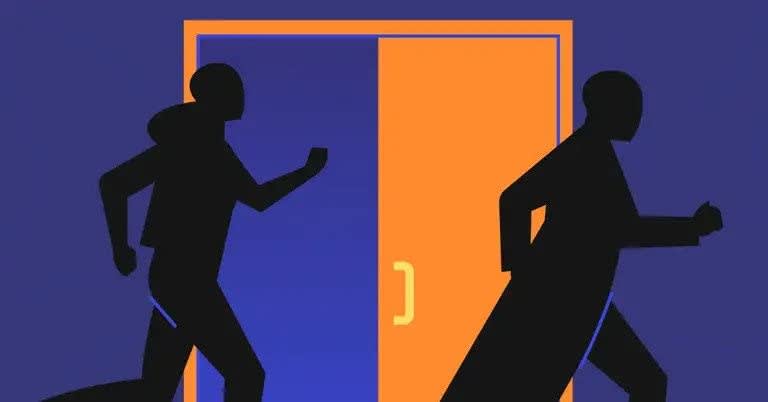The world’s first viral podcast has spawned one of the most popular genres on the planet, where narrators introduce an event and spend the rest of the episodes trying to piece together the clues and shed new light on previously neglected evidence. It’s about as gripping as audio entertainment gets. There are countless investigative podcasts out there, with these ten being a perfect introduction to the genre.
Australia’s Northern Territory isn’t your usual mass of land. This outback covers an area larger than South Africa, Pakistan or Colombia, but is home to less than 250,000 people. This sparsely populated part of the world is the setting for Mark Whittaker’s Blood Territory, a podcast that dives deep into the curious case of Jimmy O’Connell, a 24 year old man who was brutally murdered in 2006.
‘Brutally’ might be an understatement. O’Connell’s body was found mummified and mutilated not far from the burnt out wreck of his car. His best friend and fishing buddy, a 33 year old man called Patrick Mather, was found guilty of his murder and eventually confessed as much, although he claimed that he only took a manslaughter plea to avoid the murder trial and a life behind bars.
The catch? O’Connell’s parents believe Mather. This 10-episode Audible Original is about the search for truth in a hostile land. But it’s also an investigation into an unsolved murder, the complexity of friendship off the beaten track, and the powerful force that is hope.
Many investigative and true crime podcasts tend to bring lesser known cases into the mainstream, shining a light on murders that often didn’t make it out of the local newspapers. Not so West Cork, an Audible Original that dares to tackle an unsolved murder that redefined a nation.
In 1996, French filmmaker Sophie Toscan du Plantier headed to West Cork to spend the Christmas holidays on her own, in a holiday cottage surrounded by idyllic countryside. On 23 December she was murdered, her beaten body found next to the house. The murder remains unsolved. Suspects have been arrested over the years, but every step forward seemed to be followed by two steps back.
The case has haunted Ireland ever since. The investigation that followed was a shambolic conveyer belt of excess that allowed the tragedy to redefine a place that was once prized for its serenity. This 13-part podcast is more human than your standard investigative podcast and is all the more impactful for it.
What immediately jumps to mind when you think about Sydney? The Opera House and Harbour Bridge? The sandy beaches and masses of beautiful people? Lebanese gang wars in the 2000s? It’s the latter that sits at the heart of Mahmood Fazal’s audio run-through of the ferocious gang wars that plagued West Sydney at the turn of the millennium.
The podcast itself takes a violent killing as its starting point: the very public murder of 14 year old Edward Lee, following an altercation on Telopea Street. The people responsible for the murder became known as the Telopea Street Boys and the 800 metre thoroughfare became the centre of Sydney’s biggest problem – a cultural divide that became even more complex in a post-9/11 world.
Mahmood Fazal is an engaging conduit throughout it all, a former gang-member turned journalist who isn’t afraid to ask questions that might land him in the hottest of waters, all in the quest for clarity and understanding. Telopea Street might not be the hotbed of crime that it was a couple of decades ago, but the impact of its violent reputation still reverberates around Sydney today.
A follow-up of sorts to his 2017 documentary My Mother’s Lost Children, Danny Ben-Moshe once again tackles the incredible story of his most unusual family. In 1955, his mother’s husband and two children seemed to vanish into thin air, only to reappear without a word some 40 years later. Things like that don’t just happen, do they?
My Lost Family is everything its predecessor was and then some. An engaging and surprisingly funny tale of generational trauma, secrets, misinterpretations and cultural politics. Few titles traverse the line between heartbreaking and uplifting as skilfully and with as much character as this.
It’s essentially the story of every mother’s worst nightmare, told by someone in the very heart of the storm. Lies, truth, conjecture – this one has it all.
Described by some as the pinnacle of true crime podcasting, Evil Has A Name is the perfect definition of the idea that it is not about the destination, but about the journey. The Golden State Killer was the great boogeyman of California crime, believed to have committed 13 murders and more than 50 rapes between 1974 and 1986. It wasn’t until 2018 that he was finally arrested.
This incredible tale is told by the two men who were closest to the famous case: the investigator and a former FBI profiler and prosecutor. This was a case that redefined how California approaches crime, with laws changed specifically in the hope of catching the Golden State Killer.
This is a story with personality in spades, taking listeners on a journey from relative hopelessness to the eventual arrest of Joseph James DeAngelo, a former police sergeant.
Welsh journalist Jon Ronson is no stranger to unorthodox stories, cyber-bullying and the complexities of the adult entertainment industry. So it is hard to think of someone better qualified to explore the 2017 suicide of August Ames.
Aged just 23 when she died, Ames had performed in more than 290 movies and was a respected star in the industry, only to be subjected to immense online harassment following an anti-gay tweet. Days after the tweet was sent, she took her own life.
But there is much more in these seven episodes than a look into the life and death of a porn star. In interviews, Ronson has been keen to distance the podcast from the true crime genre and it is easy to see why, as the title takes the listener into the heart and soul of a much-misunderstood industry, where camaraderie and mental health issues seem to be prevalent in equal measure.
The Last Days of August isn’t the easiest podcast to listen to, but important pieces of work are rarely a walk in the park.
If you are already fairly anxious about a potential lack of security online, this might not be for the podcast for you. Tech writer Geoff White takes one for the team in this chilling series, exploring the darkest spaces of the internet’s most nefarious corners. How bad is it? Worse than you think.
The Dark Web is a frequent topic in modern-day news, but few ordinary people know exactly what it is. White and co-host Bernard Achampong do their best to lay bare the unsettling secrets through a collection of interviews and secret recordings, uncovering a world of corporate hackers, drug dealing, weapons sales, international fraud and a whole lot more. They debate things like ethics and anonymity along the way.
The rise of true crime and investigative podcasts has largely stemmed from a curiosity of the other, as ordinary people learn about unbelievable events in towns and villages far, far away. The Dark Web focuses on something that is right in front of us all. Unnerving stuff.
History is full of eccentric cults that have impacted the world in a variety of ways. Jonestown? That was something else entirely. Jim Jones and his army of brainwashed followers (known formally as the Peoples Temple) set up camp in the Guyanese jungle, only for Jones to eventually lead 909 of his followers into what he termed ‘revolutionary suicide’. Others prefer the term ‘mass murder’.
Just a handful of people survived the massacre, which took place in November of 1978. Tim Carter was among them, a trusted member of the inner circle who worked out what was happening too late to save those closest to him.
Carter tells his harrowing story in Escape from Jonestown, a six-part podcast that takes a less orthodox approach to storytelling, focussing on the immense emotions of the ordeal.
Football is one of the most beloved games on the planet, but what is the Beautiful Game doing to our beautiful brains? This four-part podcast tackles an incredibly complex subject with immense skill, opening eyes and ears to a subject that seems to grow in importance with every passing year.
Hana Walker-Brown guides the listener through the intricate and complicated world of CTE (Chronic Traumatic Encephalopathy), a neurodegenerative disease brought on by repeated blows to the head. It’s a form of rapidly enhanced dementia for which there is no cure and no treatment. The discovery of the condition and the research around it has been particularly important for contact sports like American football, rugby and football, not to mention boxing and ice hockey.
The science is complex but Walker-Brown is a truly gifted narrator, engaging with widows and children of those lost to the condition with a tenderness that should be celebrated. It makes science human and allows the subject to be understood in both the brain and the heart.
The 2011 massacre of 300 people in Allende, a Mexican town just 34 miles from the United States border, shocked the world. Some were related to people involved in local drug cartels, but the majority were ordinary people who happened to live in the wrong place at the wrong time. The remains of the murdered weren’t found until 2014.
A former winner of the Pulitzer Prize for National Reporting, Ginger Thompson is no stranger to unearthing details that those in charge might not want to be public knowledge. Thompson investigates the killings, interviewing locals on both sides of the border and uncovering the role of the United States Drug Enforcement Agency (DEA) in the process. The story is every bit as intense as you expect from the title.
No one has ever been held to account for the mass murder and the role of the DEA remains another stain on the US government’s war on drugs. The story won’t put a smile on your face, but there are few better examples of investigative podcasting in an increasingly packed genre.














